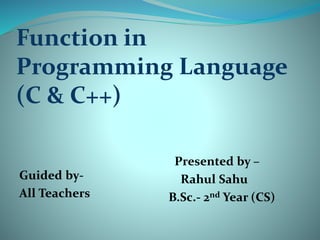Function in C and C++
•Download as PPTX, PDF•
2 likes•98 views
Programming language C & C++ Function
Report
Share
Report
Share

Recommended
More Related Content
What's hot
What's hot (20)
Similar to Function in C and C++
Similar to Function in C and C++ (20)
functions in c language_functions in c language.pptx

functions in c language_functions in c language.pptx
Recently uploaded
https://app.box.com/s/x7vf0j7xaxl2hlczxm3ny497y4yto33i80 ĐỀ THI THỬ TUYỂN SINH TIẾNG ANH VÀO 10 SỞ GD – ĐT THÀNH PHỐ HỒ CHÍ MINH NĂ...

80 ĐỀ THI THỬ TUYỂN SINH TIẾNG ANH VÀO 10 SỞ GD – ĐT THÀNH PHỐ HỒ CHÍ MINH NĂ...Nguyen Thanh Tu Collection
Recently uploaded (20)
80 ĐỀ THI THỬ TUYỂN SINH TIẾNG ANH VÀO 10 SỞ GD – ĐT THÀNH PHỐ HỒ CHÍ MINH NĂ...

80 ĐỀ THI THỬ TUYỂN SINH TIẾNG ANH VÀO 10 SỞ GD – ĐT THÀNH PHỐ HỒ CHÍ MINH NĂ...
ICT role in 21st century education and it's challenges.

ICT role in 21st century education and it's challenges.
ICT Role in 21st Century Education & its Challenges.pptx

ICT Role in 21st Century Education & its Challenges.pptx
UGC NET Paper 1 Mathematical Reasoning & Aptitude.pdf

UGC NET Paper 1 Mathematical Reasoning & Aptitude.pdf
Fostering Friendships - Enhancing Social Bonds in the Classroom

Fostering Friendships - Enhancing Social Bonds in the Classroom
General Principles of Intellectual Property: Concepts of Intellectual Proper...

General Principles of Intellectual Property: Concepts of Intellectual Proper...
Food safety_Challenges food safety laboratories_.pdf

Food safety_Challenges food safety laboratories_.pdf
On National Teacher Day, meet the 2024-25 Kenan Fellows

On National Teacher Day, meet the 2024-25 Kenan Fellows
HMCS Max Bernays Pre-Deployment Brief (May 2024).pptx

HMCS Max Bernays Pre-Deployment Brief (May 2024).pptx
Function in C and C++
- 1. Function in Programming Language (C & C++) Guided by- All Teachers Presented by – Rahul Sahu B.Sc.- 2nd Year (CS)
- 2. Definition:- A large program can be divided into a series of individual related programs called “Modules”. These Modules are called “Function”. The function can be classified into two categories – i. In-Built Function ii. User Defined Function
- 3. Defining a function: - return type_function name(Argument) { ---------------------------- Body of function ---------------------------- } i. Return type ii. Function name iii. Argument iv. Body of function
- 4. Element of User Defined Function:- Three elements of User Defined Function – i. Function Declaration ii. Function Definition iii. Function Calling
- 5. Function Declaration:- Function are like variables. As variables are declared before they are used, we normally declare the function before they are defined and end with semicolon. This is called Function Declaration. Example:- int add(); float per();
- 6. Function Definition:- The program module that is written to achieve a specific task is called Function Definition . Example:- add() add() { { int a,b,c; int a,b,c; scanf(“%d %d”,&a,&b); cin>>a>>b; c=a+b; c=a+b; printf(“n %d”,&c); cout<<c; } }
- 7. Function Calling:- We know that execution always start from main function. If we want to use the function that we have just discussed, it has to be invoke. This is called Function Call. Example:- void main( ) { add( ); }
- 8. Example:- #include<stdio.h> #include<iostream.h> #include<conio.h> #include<conio.h> int add( int a, int b) int add(int a, int b) { { int c; int c; c=a+b ; c=a+b; printf(“n %d”,c); cout<<“addition of no.=“<<c; } } void main ( ) void main( ) { { add(2,3 ); add(3,4); } } Output:- 5 Output:- addition of no. 7
- 9. Argument or Parameter:- The Argument or Parameter can be classified into two categories – i. Formal Argument Example:- int add( int ,int) ii. Actual Argument Example:- add(4,5)
- 10. Passing Argument to function:- Two type of Passing Argument to function – i. Call By Value ii. Call By Reference
- 11. Call By Value:- When a function is called with actual parameters, the values of actual parameters are copied into formal parameters. If the values of the formal parameter change in the function, the values of the actual parameters are not changed. This way of passing, parameters is called “Pass by Value” or “Call by Value”.
- 12. Call By Reference:- In call by reference, a function is called with addresses of actual parameters. In the function header, the formal parameters receive the addresses of actual parameters. Now, the formal parameters do not contain values, instead they contain addresses. Any variable if it contain an address, it is called a pointer variable. Using pointer variables, the values of the actual parameters can be changed. This way of passing parameters is called “Pass by Reference” or “Call by Reference”.
- 13. Thank You
